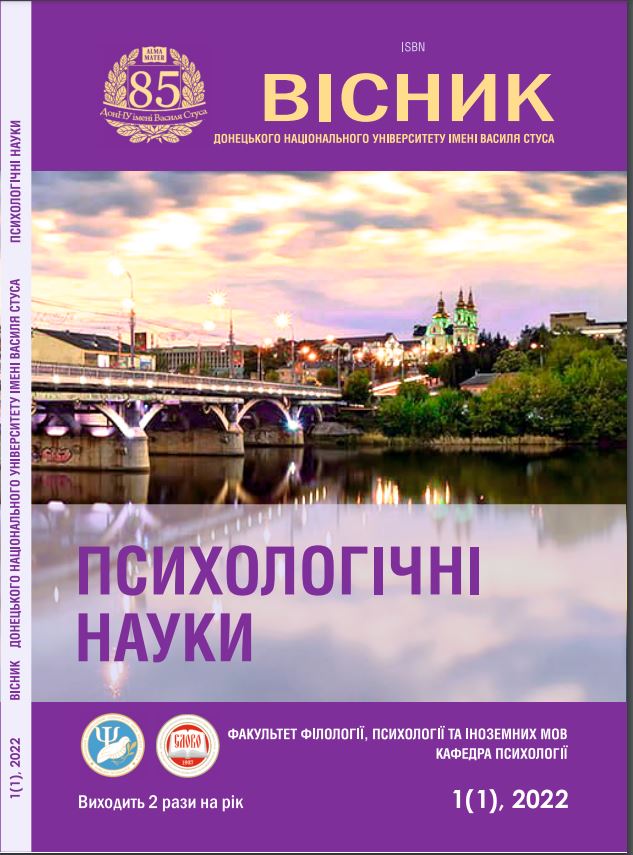Reflection of the target orientation of the individual in socially useful activities
DOI:
https://doi.org/10.31558/2786-8745.2022.1(1).1Keywords:
target orientation; altruistic position; egocentric position;rational;socially useful activity; personality developmentAbstract
The article presents the results of a study of the development of a target orientation among applicants for higher education. Theoretical approaches to understanding the phenomena of «orientation» and «target orientation» in modern psychology are analyzed. The analysis of the results obtained made it possible to identify qualitative shifts in the development of the target orientation of students who were engaged in volunteer activities during the study: a positive attitude towards themselves, towards people around them, an understanding of their needs and problems, a desire to help, an increase in emotional stability to high and medium levels, an increase in the level of independence and organization, self-determination in life, development of the ability to set specific goals and their timely implementation, increasing the level of educational motivation. According to the last section, the spheres are arranged as follows: friendly, social and family, educational, amateur and personal, intimate. Such data testify to the nobility and scale of the goals that students set for themselves. Their attention is no longer directed at themselves, but at close and surrounding people, at society as a whole. The number of goals related to learning has increased significantly. At the end of the experiment, there is a tendency to increase the prestige of studying at the university and gaining knowledge for use in later life. With the help of Student’s t -criterion for dependent samples, significant differences were established between all components of the results of the three positions of the target orientation of students of the first and second sections.
References
Балл Г. О. До обгрунтування раціогуманісичного підходу у психології. Психологія і суспільство. 2004. № 4. С. 60–74.
Бех І. Д. Психологічні механізми сходження особистості до духовних цінностей. Педагогіка і психологія. 2011. № 2 (7). С. 37–44.
Васильев Я. В. Уровневая структура психологии. Николаев: Изд-во «Илион», 2005. 264 с.
Клочко В. Е. Целеобразование и динамика оценок в ходе решения мыслительных задач. Психологическое исследование интеллектуальной деятельности / Под. ред. О. К.Тихомирова. М.: МГУ, 1979. С. 87–95.
Коган А. Ф. Психологическое моделирование целеполагания и принцип псевдосвободы выбора цели в учебной деятельности. Психология. Сб. научных трудов. [вып. 3-ий]. К.: ООО «КММ», 1999. С. 212–222.
Леонтьев А. Н. Деятельность. Сознание. Личность: учебное пособие 2-е издание, стереотипное. М.: Смысл: Академия, 2005. 352 с.
Максименко С. Д. Генеза здійснення особистості. К.: Видавництво «КММ», 2006. 255 с.
Міляєва В. Р., Лебідь Н. К. Мотивація професійного вдосконалення як чинник розвитку лідерства в освіті. Теоретичний та науково-методичний часопис «Вища освіта України». 2014. №4 (додаток№1). С.21-25.
Моляко В. А. Психология решения школьниками творческих задач. К.: Рад.школа, 1983. 94 с.
Рибалка В. В. Психологічна структура особистості. Психологія: Підручник / Ю. Л.Трофімов, В. В.Рибалка, П. А. Гончарук та ін.; за заг. Ред. Ю. Л. Трофімова. 2-ге вид., стереотип. К.: Либідь, 2000. С. 116–122.
Рубинштейн С. Л. О личностном подходе. Психология личности в трудах отечественных психологов / Сост. Л. В. Куликов. СПб.: Питер, 2001. С. 23–32.
Саннікова О. П. Макроструктура особистості: психологічний опис. Наука і освіта. 2013. №7. С. 7–13.
Титаренко Т. М. Життєві домагання особистсоті: феноменологічний та структурно-функціональний підхід. Психологія і суспільство. 2004. №4. С. 128–145.
Томчук М І. Методологічні засади дослідження та формування психологічної готовності особистості до діяльності. Психологія і суспільство. 2010. №4. С. 41–46.
Фурман А. А. Морально-етичні цінності в суспільному вимірі. Психологія і суспільство. 2010. №1. С. 94–99.
Фурман А. В. Методологічне обгрунтування концепції мотиваційних психоформ. Вітакультурний млин. 2010. Модуль 12. С. 9–19.

